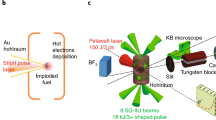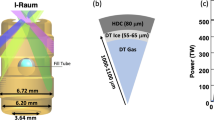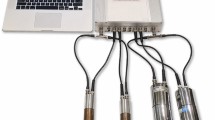Abstract
EXPERIMENTS have been performed in the reactor Pluto as a stage in the development of cæsium-neutralized diodes for the direct conversion of fission heat to electric power. This work is similar to that being carried out in the United States, and the first fission-operated diode was reported by Grover at Los Alamos in 19591. Due to its greater cathode area, the present device has produced a larger value of output current than hitherto reported and incorporates a number of new features. Measurements were made with two rigs, the object being to test the fuel rod material and method of mounting, to determine temperature distributions and heat transfer data and to study the performance of the diodes as generators.
This is a preview of subscription content, access via your institution
Access options
Subscribe to this journal
Receive 51 print issues and online access
$199.00 per year
only $3.90 per issue
Buy this article
- Purchase on Springer Link
- Instant access to full article PDF
Prices may be subject to local taxes which are calculated during checkout
Similar content being viewed by others
References
Grover, G. M., Nucleonics, 54 (1959).
Author information
Authors and Affiliations
Rights and permissions
About this article
Cite this article
DUNN, P., RICE, G., SANDERS, L. et al. Direct Conversion of Fission Heat to Electric Power. Nature 195, 65–66 (1962). https://doi.org/10.1038/195065b0
Issue Date:
DOI: https://doi.org/10.1038/195065b0
Comments
By submitting a comment you agree to abide by our Terms and Community Guidelines. If you find something abusive or that does not comply with our terms or guidelines please flag it as inappropriate.



